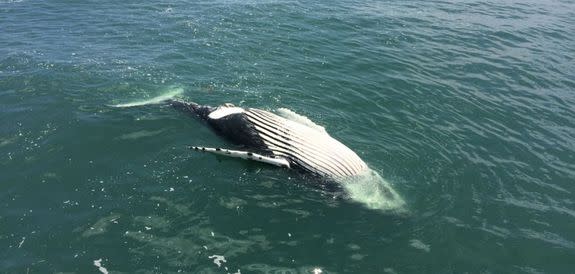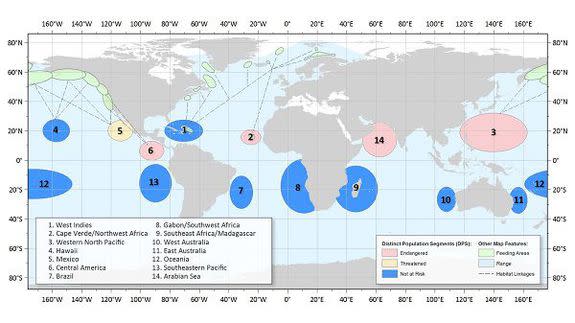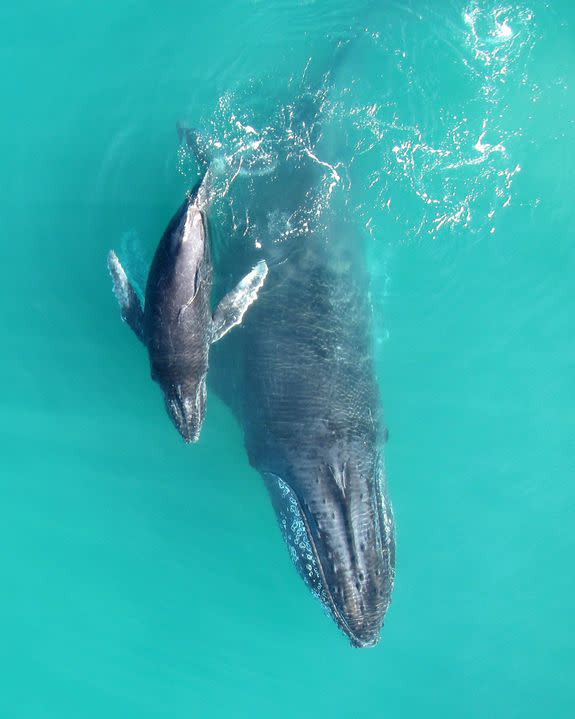Dozens of humpback whales have died in the last year and nobody knows why

Hey, humpback whale fans. We've got some really cute news and some really sad news about your favorite 80,000-pound mammal.
Let's start with the grim: A troubling number of humpback whales are dying on the U.S. East Coast.
Fisheries officials this week declared an "unusual mortality event" following the deaths of 41 humpbacks from Maine down to North Carolina.
SEE ALSO: Serene underwater footage shows whale's-eye view of Antarctica
In that region, 15 whales have died so far in 2017, adding to the 26 humpback deaths last year, the National Oceanic and Atmospheric Administration (NOAA) reported. In an average year, only about 14 humpbacks die along that coastal stretch.
NOAA scientists said they don't know why humpbacks are dying in such high numbers, though they're about to take a deeper look.

Image: MERR Institute
By declaring an unusual mortality event, NOAA kicked off a formal investigation process that could take months or years to complete, according to Mendy Garron, a stranding coordinator for NOAA Fisheries Greater Atlantic Region office.
The Marine Mammal Protection Act defines an unusual event as "a significant die-off of any marine mammal population" that requires an "immediate response," she said during a Thursday press conference.
Scientists have examined 20 of the 41 dead whales and found no evidence of an infectious disease. Ten of them, however, showed signs of blunt-force trauma or cuts from a ship strike — a significant jump.

Image: NOAA Fisheries
Since there likely hasn't been a spike in vessel traffic in these parts, experts suspect the rise in ship strikes might be because the fish and krill whales eat are moving into harm's way.
Whale prey might be moving around due to warmer water temperatures — which are rising in part because of human-driven climate change — though scientists don't know for sure, Greg Silber, a biologist with NOAA's Office of Protected Resources, told reporters.
Ok, so... How about that really cute news?
Ecologists in Denmark and Australia found that newborn humpbacks "whisper" to their mothers to avoid being overheard by hungry killer whales.
Scientists used temporary tags on humpback mothers and calves in Exmouth Gulf in western Australia to record their interactions.
The study, published this week in the journal Functional Ecology, found that baby whales communicate in "intimate grunts and squeaks" with their moms during the long migration to their feeding grounds. That's far more subtle than the loud, sonorous groans of male humpbacks.
"This migration is very demanding for young calves," Simone Videsen, the study's lead author and a researcher at Aarhus University, said in a news release.

Image: Fredrik Christiansen
"They travel 5,000 miles across open water in rough seas and with strong winds," she said. "Knowing more about their suckling will help us understand what could disrupt this critical behavior, so we can target conservation efforts more effectively."
For the study, researchers applied suction-cup tags to eight calves and two mothers. They found that mothers and calves spend significant amounts of time nursing and resting. Data tags also showed that calves "whispered" while swimming, suggesting the quiet calls help keep mom and baby together in murky waters.
"Killer whales hunt young humpback calves outside Exmouth Gulf, so by calling softly to its mother, the calf is less likely to be heard by killer whales and avoid attracting male humpbacks who want to mate with the nursing females," Videsen said.
She said the findings could help researchers better protect this crucial humpback habitat and ensure the nursers waters are kept as quiet as possible.
